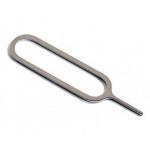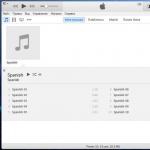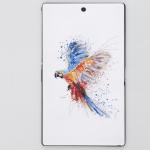Holiday for children of the senior group “Autumn. Synopsis of the GCD in the group preparatory to school “Oh, what an autumn! Summary of the autumn lesson in the senior group
Compiled by:
Aigumova Svetlana Magomedovna,
educator
MBDOU kindergarten "Snow White"
Solnechny Surgut district
Tasks:
Educational:
- summarize children's ideas about autumn as a season, its signs
- to clarify children's ideas about seasonal changes in the life of plants and animals and about the variety of options for their preparation for winter
- to consolidate children's ideas about the connection between animate and inanimate nature in the autumn period, about autumn human chores
Rdeveloping:
- develop attention, memory
- improve general motor skills and coordination
- develop the ability to restore a logical relationship, draw conclusions
Rechical:
- answer the questions with full answers, encourage the compilation of complex sentences
- activate dictionary: leaf fall, frost, harvest, bad weather, bad weather, slush, precipitation, cloudiness, mountain ash, purple, gold, crimson; migratory, wintering
- teach the basics of word formation: form and use relative adjectives in speech
AThospitals:
- cultivate a desire to observe the beauty of autumn nature
- nurture a sense of love for the native nature
- to cultivate a careful, caring attitude towards the world around us: plants, birds, animals
Individual work: include in the work of inactive children: Angela J., Karolina A.; involve Ruslan G., Vlad G. in commenting on the answers of other children
Didactic material: Petrushka doll; illustrations and paintings depicting autumn landscapes, autumn works, changes in the animal world; subject pictures on the topic “trees”, “birds; leaflets with the didactic exercise "Tops-roots" for each child, colored pencils; didactic games: “Seasons”, “Animal world”, “From what tree is a leaf”, “Name the leaf”
Preliminary work:
Looking at pictures, reading poems, riddles, proverbs about autumn, printing autumn leaves. Drawing on the theme "Golden Autumn"; didactic games.
Methods and techniques used in the lesson:
information-receptive method,
verbal method,
visual method,
practical method,
game method.
Course progress.
Classical music sounds. P.I. Tchaikovsky "Autumn". The lesson begins in the educational corner next to the exhibition of children's drawings and crafts made from natural materials.
Guys, guess the riddle:
He is with a bell in his hand,
In a blue-red cap.
He is a fun toy
And his name is ... Petrushka
Today Petrushka came to visit us, and we will tell him what we know about autumn. - Well, what, guys, tell me? Listen to the beautiful calm music. The composer P.I. Tchaikovsky called this melody “Autumn”. Today we will try to remember all the most important, beautiful and interesting things about autumn. We had a competition of drawings "Golden Autumn", you know poems, songs and riddles about it, we watched a lot of autumn changes, made crafts from natural materials. I think you have something to say.
- In order not to get confused, I suggest everyone to think: what would you like to tell our guest? What will we talk about first? Then? You will be helped hint diagrams.
Inanimate nature
Vegetable world
Animal world
Inanimate nature in autumn.
- When does autumn come?
What autumn months do you know?
What do we refer to inanimate nature? (To inanimate nature, we include natural phenomena, such as precipitation, cloudiness, wind, day length, weather.)
What are the signs of autumn in inanimate nature?
More, tell me, how does the day become? (In autumn, the days become shorter and the nights longer.
Why is the weather getting cold? (The sun is no longer shining as bright and hot as in summer, so the weather is getting cooler) - What precipitation is typical for autumn? (It rains more often, in late autumn, in October in our North, it even snows.)
- What other natural phenomena did you observe in autumn days? ( In the mornings there is fog or frost, sometimes puddles covered with a thin crust of ice).
Mark, do you want to add something? ( In the mornings, on the grass, I noticed drops of dew when I walk through the streets - damp, slushy.)
Parsley: "Oh, how boring!"
Yes, Petrushka! Autumn is a dull but colorful time.
The famous Russian poet - A.S. Pushkin wrote many poems about autumn.
Sad time! Oh charm!
Your farewell beauty is pleasant to me -
I love the magnificent nature of wilting,
Forests clad in crimson and gold,
In their canopy of the wind noise and fresh breath,
And the heavens are covered with mist,
And a rare ray of sun, and the first frosts,
And distant gray winter threats ...
Guys! And so that Petrushka is not bored, we will ask him to help collect the leaves.
Didactic game "From what tree leaf ? (Children collect leaves scattered on the floor. Vlad - maple, Angela - birch, Carolina - mountain ash, Said - poplar, Parsley-aspen.) Well done, right.
Oh, Petrushka, are these aspen leaves? Let's help Parsley collect the right leaves.
Parsley: Thank you. Guys, now I remember!. And I suggest playing my favorite didactic game "Name the leaf". I name the tree, and you name which leaf.
oak - oak
maple - maple
aspen - aspen
rowan - rowan
birch - birch
poplar - poplar
viburnum - viburnum
Well done! Correctly
Plant world in autumn
Children are seated on chairs in a cognitive corner.
- We continue our story. What are we going to talk about now? ( we will talk about plants.)
- What do we refer to the plant world? (The flora includes trees, shrubs, herbs, flowers, mushrooms.)
- What changes occur with trees and shrubs with the advent of autumn and why? (In autumn, the leaves fall from the trees, because from the cold the juice in the trunk and twigs moves more slowly, and its leaves are not insufficient, the leaves change their color and leaf fall begins.)
Ruslan, Shahla, what else interesting can you add about the leaves? (Riddle about leaves.)
Grow green in summer
And fall yellow in autumn.
They lie under their feet
You walk - rustle,
bright, colored,
The edges are carved.
- What changes in the life of herbs and flowers? (The grass withered, withered, because it became cold and there was not enough sunlight.)
Finger gymnastics "Autumn"
The north wind blew
(blow on fingers)
S-S-S blew all the leaves from the linden
They flew, swirled and fell to the ground.
(palms zigzag gently lower on the table)
The rain began to knock on them drip-drip-drip - 2 times,
(tap finger on table)
The hail hammered on them, pierced the leaves through and through.
(pound fists on the table)
The leaves pierced through everything, then the snow powdered,
(smooth movements back and forth with brushes)
Covered them with a blanket.
(palms firmly on the table)
Animal world in autumn
So the turn came to the animal world, very rich and diverse. (change pictures)
- Whom do we refer to the animal world? (To the animal world we include animals, birds, insects, amphibians.)
- What happens with the arrival of autumn in the life of animals? (All animals prepare for winter. Some hibernate, for example, bear, hedgehog, badger. Others stock up for the winter, such as squirrel, hamster.)
- Daniel, do you want to add something? (In autumn, animals shed: they change summer coats for winter, warmer ones.)
- Amphibians and insects, probably, also make stocks for the winter? (No, amphibians, insects, hibernate until spring.)
- what changes in the life of birds with the advent of autumn? ( There are some birds that fly away for the winter to warmer climes.)
- And what are the names of the birds that fly away from us for the winter? (Such birds are called migratory.)
- Why do they fly away? Crows, jackdaws, sparrows remain with us year-round. (And in autumn the sun heats little, it becomes cool, there are fewer insects.)
How do the birds that stay with us survive? (These birds live next to a person, and so that they do not die of hunger or freeze, you need to feed them, build feeders.)
- Right. Such birds are called settled.
And, of course, they are waiting for help from us in the winter. And we will definitely build feeders for them together with moms and dads.
Didactic game "Fly away - do not fly away"
Children stand near the chairs .
You flap your arms like wings if the named bird flies south. If the bird remains, crouch.
Crow, rook, jackdaw, dove, swallow, sparrow, duck, starling.
- Well done! Very attentive.
Parsley: "Guess the riddle!"
Chatty bird - no doubt,
Tell the news and the secret!
Beautiful in appearance, white-sided
Who? - Long-tailed ... (magpie)
Is this bird migratory or wintering?
man in autumn
Look at the hint diagram: what are we going to talk about now? What do you think, Vlad? ( We will talk about the worries of a person in the fall.)
- Certainly. Petrushka, for sure, can’t wait to find out what we, your parents, friends and acquaintances are doing in the fall. Can you tell him how we work in autumn? (paintings on display)
- What kind of work is done in the gardens? - And in the gardens? (The lower part of the trees is whitewashed with lime so that hares do not gnaw them. In autumn, fruit trees are well watered in the gardens so that they endure frosts and give a good harvest next year)
- Sasha, what other work is done in the garden? (Even in autumn, the gardens are harvested: apples, pears, potatoes are dug and carrots.)
- Sasha M., what can you add? (riddle about cabbage)
- And how do they work in the countryside, in the fields? ( In the villages, the remaining bread is harvested, potatoes, cabbage, carrots, and beets are harvested from the fields. Harvested fields are fertilized and plowed. Seeds of winter rye and wheat are sown on plowed fields, carrots, dill and parsley are sown in vegetable gardens.)
And you guys, how did you work all autumn? ( And we cleaned the foliage on the site to help the janitor, Uncle Fyodor, to make it clean.)
Who wants to add? ( Mothers and grandmothers make preparations for the winter: jams, compotes, pickles, marinades.)
- Correctly. Autumn is very generous with gifts: fruits, vegetables, berries, mushrooms, nuts. But all her gifts must be collected and processed: conserved or dried, boiled or salted. And this is also a lot of work.
Didactic exercise "Tops-roots"
- You have colored pencils and sheets of paper with the task on the tables. It is necessary to circle in green those vegetables in which we eat tops, i.e. leaves, greens. Roots in red. And in blue are those vegetables from which we eat both.
We invite our guest Petrushka to play with us.
Everyone did their best! Parsley, did you enjoy working with the guys?
-Petrushka, think and say: have we told everything that we thought? Missed nothing?
- Whose answers did you like the most: which of the guys had the most complete and correct answers?
- Thanks for good job. Come visit us again.
List of used literature:
Akulova E.A. We learn logical relations. Didactic games for older preschoolers.// Preschool education N8, 2008
Akulova E.A. We learn logical relations. Didactic games for older preschoolers.// Preschool education N9, 2008
Arushanova A.G. Speech and verbal communication of children: A book for kindergarten teachers. - M.: Mosaic-Sintez, 2002. - 272 p.
Education and training in the kindergarten preparatory group for school. Practical and methodological recommendations Comp. T.S. Komarov. - M.: Mosaic-Sintez, 2006. - 224 p.
Game activity in the classroom for environmental education. Senior group. / Author-comp. P.G. Fedoseeva. - Volgograd: ITD "Coripheus". – 96 p.
Komratova N.G. Learning to speak correctly: Educational and methodological manual for the development of speech of children 3-7 years old. - M.: TC Sphere, 2005. - 208 p. (Development program)
Komratova N.G., Gribova L.F. The world in which I live. A methodological guide for familiarizing children 3-7 years old with the outside world. -.: TC Sphere, 2005. - 144 p. (Development program).
Preschool education N12 - 2005
Paramonova L.G. Vocabulary development in children. - St. Petersburg: "Childhood-Press", 2007. - 80 p.
The development of connected speech. Preparatory group./ Author-comp. T.V. Ivanova. - Volgograd: ITD "Coripheus". – 96 p.
Skorolupova O.V. Classes with children of senior preschool age on the topic “Autumn. Part 1 "- M .: OOO" Publishing House Scriptorium 2003 ", 2006. - 128 p., illus.
We invite teachers of preschool education in the Tyumen region, YaNAO and Khanty-Mansi Autonomous Okrug-Yugra to publish their methodological material:
- Pedagogical experience, author's programs, teaching aids, presentations for classes, electronic games;
- Personally developed notes and scenarios of educational activities, projects, master classes (including video), forms of work with families and teachers.
Why is it profitable to publish with us?
Goals:
1. Instill love for autumn nature.
2. Cultivate a sense of respect for bread.
3. Improve and systematize students' knowledge about the benefits of vegetables.
Equipment: the board is decorated with folk scarves, the name of the holiday, the masks of the months, vegetables, an autumn costume, 2 baskets, a large basket, a tray, various vegetables and fruits, a loaf of bread, a towel, a tape recorder, a cassette with a recording of songs.
The course of the holiday.
Leading: The sun is tired,
You are warming up!
Yellow and scarlet
Sheets are spinning.
In the rustle and in the rustle
Our autumn garden
On the paths heaps of motley lie.
Who's to say, who knows when it happens?
Children: In autumn.
Host: Autumn! Autumn! Please visit!
Autumn: Hello guys!
Are you talking about me? Here I am!
Hello autumn to you, friends!
Are you glad to meet me?
Do you like forest outfit -
Autumn gardens and parks?
I came to you for a holiday
And she brought her brothers with her.
Of course you know them.
(3 students come out - autumn months)
September: Our school garden is empty,
Leaves fly in the wind
And to the south end of the earth
Cranes stretched out
School doors opened.
What month has come to us?
- What do you know about me?
October: All the darker face of nature -
Blackened vegetable gardens
The bear hibernated
What month has come to you?
“And what do you know about me?”
November: The field became black and white,
It's raining, it's snowing,
And it got colder
Ice bound the waters of the rivers,
Winter rye freezes in the field.
What month, please?
Do you know my signs?
Host: Well done guys!
Autumn is a great time!
The kids love autumn.
Plums, pears, grapes -
It's all over for the guys.
Hello, autumn!
Hello, autumn!
It's good that you came.
We, autumn, will ask you:
Children: “What did you bring as a gift?”
Autumn: I brought you flour.
Children: So, there will be pies.
Autumn: I brought you buckwheat.
Children: The porridge will be in the oven.
Autumn: I brought you pears.
Children: We will dry them for the future.
Autumn: And apples are like honey.
Children: For jam, for compote.
Autumn: I brought you a full deck of honey.
Children: You and apples, you and bread,
You brought honey
And good weather
Have you saved us autumn?
Autumn: Are you happy about the rain?
Children: We don't want to, we don't have to.
Leading: Autumn, you see that our guys are so brave that even the rain is not a hindrance to them. And we'll sing you a song about it.
(Children sing the song of the cat Leopold “We will survive this trouble”)
Host: What else have you brought us, autumn?
Autumn: Mushrooms. And guess what?
1. I'm growing up in a red cap
Among the roots of aspens,
You will see me from a mile away
My name is ... (boletus)
2. I do not argue, not white-
I, brothers, are simpler ...
I usually grow
In a birch grove. (Boletus)
3. There are no mushrooms friendlier than these
Adults and children know
They grow on stumps in the forest,
Like freckles on your nose. (Honey mushrooms)
4. Very friendly sisters
They wear red berets
Autumn is brought to the forest in summer
Golden ... (chanterelles)
Host: Do you guys know how to pick mushrooms?
Competition"Mushroom picking"
- Whoever collects more mushrooms in a basket is the best mushroom picker. (2 students)
Leading: Autumn, and the guys also want to guess riddles, and the answers are in the garden.
1. What they dug from the ground,
Roasted, cooked?
What we baked in the ashes
Did they praise? (Potato)
2. The whole summer tried
Dressed, dressed.
And as autumn approached,
I gave all the outfits -
Hundreds of clothes folded
We are in a barrel. (Cabbage)
3. Above the ground - grass,
Under the ground - a scarlet head. (Beet)
Leading: Our harvest is good,
Born densely:
Both carrots and potatoes
white cabbage,
blue eggplant,
Red tomato...
(Staging)
Leading: The hostess once came from the market,
The hostess brought home from the market:
potato
carrot,
parsley and beets.
Here the vegetables got into an argument.
Pepper: Which of us is from vegetables,
And tastier, and more necessary?
Who in all diseases
Will it be better for everyone?
Peas: I'm so pretty
green boy,
If I only want
I will treat everyone with peas!
Beet: Let me say at least a word to me,
Listen first.
Beets are needed for borscht
And for the vinaigrette.
Eat yourself and treat -
There is no better beetroot!
Cabbage: You, beets. Shut up!
Shchi is cooked from cabbage!
And what delicious cabbage pies!
Radish: I am a ruddy radish.
I bow low to you.
Why praise yourself?
I am already known to everyone.
Cucumber: You will be very pleased
Eating a lightly salted cucumber.
And a fresh cucumber
Everyone will love it, of course.
Carrot: The story about me is not long.
Who doesn't love vitamins?
Always drink carrot juice
And gnaw carrots -
Will you then, my friend,
Strong, strong, dexterous.
Tomato: Don't talk, carrot, nonsense,
Shut up a little.
The most delicious and pleasant
And, of course, tomato juice.
Onion: I am the seasoning in every dish
And always helpful to people.
Guessed? I am your friend!
I'm just a green onion!
Potato: I, the potato, are so modest -
Didn't say a word...
But the potatoes are so necessary
Both big and small!
Eggplant: Eggplant caviar
So healthy, so delicious.
Autumn: It's time to end the dispute.
Vegetables: It's useless to argue.
A game"Prepare"
- You have fruits and vegetables. You need to choose products for making borscht and compote. (2 students)
Leading: Autumn gives us vegetables, fruits, mushrooms, and berries, but the most valuable, most expensive gift is ... bread. After all, they often say:
Bread is the head of everything.
Bread on the table - and a table-throne.
Not a piece of bread - and a table - a board.
Lunch is bad if there is no bread.
- It is not easy to grow bread, but how much joy when the harvest is harvested.
(Children go out with a loaf)
1) Here it is -
Fragrant bread
With a crisp twisted crust.
warm, golden
Like sun-filled.
2) In every house,
For every table
He complained - he came.
3) In it is health, our strength,
It has wonderful warmth.
How many hands raised him
Protected, protected.
4) In it - the earth's native juice,
The sun's light is cheerful in it ..
Gobble up both cheeks -
Grow rich.
Host: Yes, it's a pity that autumn will soon leave. But we love her, we want to be friends with her next year.
(song sounds)
Autumn: Thank you guys for the holiday. I hope you invite me again next year. And now you have my gifts.
Material Description: I offer you a summary of direct educational activities for children of the group preparatory to school (6-7 years old) on the topic "Autumn Surprises". This material will be useful to educators of preparatory groups. This is a summary of cognitive activities aimed at developing the cognitive abilities of older preschoolers, consolidating the material on the topic "Autumn".
Summary of the GCD in the preparatory group on the topic: "Autumn Surprises"
Program content:
Communication.
To improve the ability to compose a story based on reference pictures, to speak freely, using their knowledge and skills of coherent speech.
Exercise in the formation of nouns (using the suffixes chk, u)
To consolidate the ability of children to clearly pronounce the consonant sound [r] [r /] (at the beginning, in the middle, at the end of the word, determine with the help of bead patterns)
Learn to select schemes for the proposal
Develop memory, imagination.
Cognition:
Deepen and expand children's knowledge about autumn
Recall and summarize with children all the seasonal changes that occur in nature in autumn
Summarize with children all autumn observations
Cultivate love and respect for nature.
Materials and equipment: basket, vegetables, reference pictures about autumn, ball, planar mushrooms, diagrams for making sentences, bead diagrams.
preliminary work: observation in nature, learning by heart "Already the sky breathed autumn"(A.S. Pushkin).
Working with parents: decoration of the exhibition "Golden Autumn"
.jpg)
GCD progress:
Children are busy with their favorite games.
The teacher brings a basket covered with a napkin into the group.
Educator:- Guys, what do you think is in this basket? (children's answers)
Educator:- Maybe there is a tomato here?
How kind can you say about him? (tomato).
And if there is a big tomato here, how do we say about it? (tomato)
caregiver: Well done! Guys, who do you think sent us this basket?
Children: Grandmother, old forest man, etc.
caregiver: Oh, look, kids, something is written on the wedge-shaped leaf, and a riddle is written, listen carefully, maybe it will help us find out whose basket it is.
Went through the meadows
Through the forests, through the fields,
She prepared supplies for you
Hid them in cellars, in bins
She said winter would come for me.
(children sit down at the tables)
caregiver: But before looking into the basket, we must say the magic words, repeat after me.
Educator: Autumn sent a cucumber.
Let's prepare the tongue and remember the phrase about cucumbers.
Tsy-tsy-tsy-ripe cucumbers
Ets-ets-ets-very tasty cucumber
(in chorus, individually)
Autumn not only sent you cucumbers, but also carrots, tomatoes, potatoes, cabbage, onions.
D / game: "The sound is lost"
.jpg)
Purpose: to consolidate the ability to distinguish sound in a word, to develop phonemic hearing.
caregiver: Guys in the word tomato, where is the sound [r] (at the beginning, in the middle, at the end of the word).
Determine the sound [p] using word patterns (carrots, potatoes, cabbage, tomatoes, onions).
caregiver: Great, smart people.
You are interested to know what other surprises autumn has prepared for you, let's remember the magic words.
“basket-basket, what lies in it,
it's time for us to open the basket-basket"
D / game "Body with mushrooms"
.jpg)
Purpose: to develop auditory attention, thinking, ingenuity.
Educator: Ah yes, autumn, she sent mushrooms, and mushrooms are not easy, they will help you read the proverb
(autumn-change-eight)
caregiver: What other proverbs about autumn do you know?
Children: possible answers
If it's clear, then autumn is beautiful
Autumn is coming and the rain is leading
From autumn to summer, there is no turn
Fungus in the box, there will be a pie in winter
Educator: Remember the signs of autumn
Children:
Thunder in September, warm autumn
Clouds are rare, it will be clear and cold
Frost to the wind in autumn
D / game "Make a diagram"
.jpg)
Purpose: to consolidate the ability to select a scheme for sentences, determine how many words are in a sentence.
Educator: Yes, you are smart!
I wonder what other surprises autumn has prepared, let's say the magic words
“basket-basket, what lies in it,
it's time for us to open the basket-basket"
caregiver: Autumn gave us a colorful ball.
An autumn and magical ball will jump into our hands and ask questions. (children stand in a circle)
Phys. Minute:
Guys, what is the weather like in autumn?
When it rains - rainy
When the wind blows - windy
When the temperature is low people wear warm clothes - cold
When the sun shines - clear
Educator: Great, sit down.
Children, we turn to our basket again. Maybe not all the surprises are over yet, we say the magic words
“basket-basket, what lies in it,
it's time for us to open the basket-basket"
Educator: Autumn would like you to talk about her, and for this she prepared reference pictures for you (individually for each child.)
D / game "Let's tell a story together"
.jpg)
Purpose: to consolidate the ability to compose a story with the help of several pictures, to develop the ability to evaluate the answers of their comrades.
Educator: Guys, what did we do today in class?
Children: - Determined where the sound [p] is located (at the beginning, in the middle, at the end) in the words tomato, potato, carrot; sound [r /] in the words radish, turnip, radish (using bead patterns)
Remembered proverbs, signs
We selected a scheme for proposals
Compiled a story based on reference pictures
Tatyana Selezneva
Abstract of the lesson in the senior group "Oseniny"
Program tasks: To give children elementary ideas about what is « autumn» to teach to see and observe change in nature; to cultivate love for the native land, for the traditions and customs of the Russian people. To acquaint children with the poetic ideas of the Russian people about autumn.
Previous work: Examining an illustration of a painting by Levitan "Golden autumn» , reading A. Tvardovsky. "Forest autumn» , K. Paustovsky "Farewell to Summer", A. Maikov « Autumn» , Russian folk tale “Seven Simeons - seven workers in the processing of Karnaukhov.
Equipment: Basket with vegetables; branches with clusters of viburnum; riddles about autumn. Drawing from nature riddles about vegetables and vegetables in a basket, viburnum twigs.
Lesson progress
Educator. Riddle about autumn:
Came without paints and without brushes
And repainted all the leaves;
The days became shorter, the nights became longer.
Who knows, who knows when it happens? (autumn) .
By what signs did you know autumn? What season is it now? What month autumn? (Children's answers, talking about signs autumn) .
No wonder they say: « Autumn - eight changes» . Like every season, autumn three months: September October November. And each month is not like the others, and in itself each month is one at the beginning, and at the end - another. The most beautiful month is September. In the first days in a green kokoshnik and in the same dress, and towards the end in a bright lush gold dress, in purple and crimson clothes.
Educator. Dear children, today we will celebrate Autumn - autumn name day! Autumn is a generous time, rich, hospitable! Vegetables ripened in the gardens, bread in the fields, mushrooms and berries in the forests. The Russian people have long celebrated autumn as a special joyful holiday - a holiday of gratitude to nature for a generous harvest.
Reading a poem by T. Shorygina.
Clusters of scarlet viburnum
Bent over the water
Today is a holiday - Osenins,
The day is transparent, golden.
Our mother earth
Let's give a low bow,
And river water - fast
We will bow later.
The sun that rose early;
We praise the harvest
Bake oatmeal from flour
Sweet, fluffy loaf.
We will treat the caravan
And cows and horses
After all, they helped us
And they worked for many days.
All summer the peasants worked from dawn to dusk in the fields and gardens.
Educator. - Tell me, guys, what did they grow in the fields, in the gardens.
From what all the days they were busy, people did not have enough time to do household chores! And finally, all the work finished: harvested, winter crops sown. It's time for household chores. It is necessary to pickle cucumbers, tomatoes, prepare potatoes, onions.
What other vegetables do you know? (Children's answers - cabbage, beets, radishes).
Women cleaned the huts, washed the windows, prepared winter clothes, darned them, and repaired them.
And what do you think, who was the main assistant to the mothers? (Children).
Who was responsible for most of the housework? (on a woman).
Educator. Therefore, in Russia this time was called "Indian summer", it lasted one week, until September 21. Tired of work, girls (girls, women (women, well done (guys)- the whole village, went out into the street. They sang, danced, danced round dances, played accordions, balalaikas, spoons, played different games - they had fun from the heart.
There are such folk signs:
Many cobwebs flying in the wind - to a clear autumn and cold winter.
A lot of acorns in September on oak - for a fierce winter.
Guys, remember the summer evenings - did it get dark early?
When evening came, did you turn on the lights at home? (Not) And why? (Because it was light outside).
In summer the days are longer, but now, autumn, they become shorter, by the evening it is already getting dark.
Educator. Guys, what are Russian folk proverbs and sayings about autumn you know?
Autumn- storehouse - winter - pick up.
Father is cold - September, but there is much to feed.
October is cold - father, and November chilled him too.
November nights are dark before the snow.
If the snow falls on the damp ground and does not melt, then in the spring snowdrops will bloom early and together.
In November, the snow will inflate - the bread will arrive.
Well done boys. I see that you know a lot about autumn and now let's play.
The owner appears with a basket of vegetables.
My harvest is not bad -
And cabbage and peas.
What's up, guess what?
Answer questions.
I have in the garden
Riddles have grown
Juicy and round.
These are round
green in summer,
turn red in autumn: (Tomatoes)
No windows, no doors
Full of people? (Cucumber)
One hundred clothes
And all without fasteners (Cabbage)
The grandfather is sitting in a hundred fur coats.
Who undresses him
He sheds tears (Onion)
Bread sucker, full ... (Potato)
Round, but not money, red, but not a girl, with a tail,
Yes, not a mouse, it sits firmly in the ground, what is it? (Turnip)
(Explanation of words, e.g.: sucker -
it means where there is bread, there are potatoes;
red - beautiful, attractive).
There is a circle on the floor (you can use a hoop).
Children guess riddles, and the owner puts models of vegetables in a circle.
The players stand behind the circle. And in the circle the driver is the owner.
The owner sings and performs movements along meaning:
I'm sitting on a rock
I am amusing small pegs,
I guard my garden,
So that the cabbage is not stolen,
Did not run into the garden
wolf and fox,
beaver and marten,
mustachioed hare,
The bear is fat.
Children trying to run into the garden, grab the cabbage and run away. Whom the owner tarnishes is out of the game. The one who takes away the most vegetables wins.
Educator. “Our master is very tired of guarding his harvest, and many vegetables have been stolen from him. We will ask him to sit down and rest. And I invite you to sit down at the tables and draw vegetables and fruits for the owner.
We have harvested all
And now it's time to say goodbye, we must wait for the winter to visit.
Osenins, Osenins we will remember for a long time.





